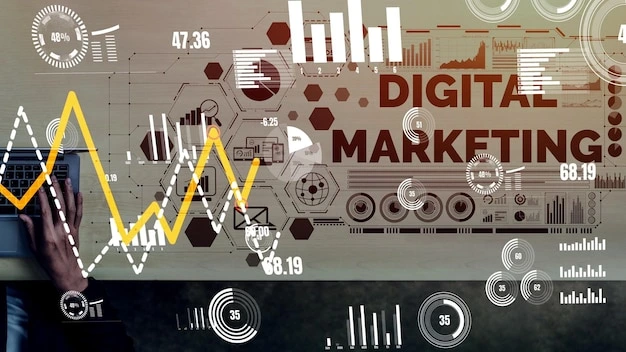Excerpt
Get ready for 2025! In this guide, we’ll dive into the top 10 data-driven digital marketing strategies you need to know. Learn about the latest trends, predictions, and the importance of analytics in shaping a successful marketing strategy.
What Does the Digital Marketing Outlook for 2025 Look Like?
As we move into 2025, digital marketing is set to become even more sophisticated and personalized. With data playing a pivotal role, marketers are leaning into AI, machine learning, and predictive analytics to understand customer needs better. Here are some notable trends shaping the future outlook for digital marketing:
- AI and Automation: Expect AI to be at the forefront of digital marketing, driving personalization, content generation, and customer service.
- Omnichannel Marketing: Consumers now expect seamless experiences across platforms. Integrating online and offline data will be crucial to deliver consistent and personalized messaging.
- Privacy-First Marketing: With increasing regulations on data privacy, marketers need to balance personalization with respecting consumer data.
In short, 2025’s digital marketing outlook points towards hyper-personalized, data-driven campaigns that are both effective and compliant with privacy standards.
What Are the Key Digital Marketing Trends for 2025?
Staying ahead in digital marketing requires keeping an eye on emerging trends. Here are the top digital marketing trends for 2025 to consider when crafting your strategy:
- Predictive Analytics: Using historical data to predict future customer behaviors is becoming a game-changer in personalization.
- Voice Search Optimization: As more users rely on voice-activated devices, optimizing content for voice search is essential.
- Video and Interactive Content: Short-form video, shoppable videos, and interactive content formats like quizzes and polls are gaining popularity.
- Zero-Party Data Collection: With growing concerns around third-party data, collecting data directly from consumers with their consent is more important than ever.
These trends highlight the shift towards data-driven marketing tactics that focus on understanding and anticipating consumer needs.
How Can Businesses Leverage Data-Driven Marketing in 2025?
Data-driven marketing involves using insights from data to create more targeted, effective marketing campaigns. But how can businesses implement this? Here’s how:
- Customer Segmentation: Use data to segment customers based on demographics, interests, and behaviors to deliver personalized experiences.
- Personalized Content: Tailor content to individual preferences, improving engagement rates and building brand loyalty.
- Optimizing Campaigns in Real-Time: Use analytics tools to monitor campaign performance and adjust strategies on the fly.
By leveraging data-driven marketing, businesses can make smarter, faster decisions that directly impact their bottom line.
Why is Analytics and Data-Driven Decision-Making Crucial in Digital Marketing?
In today’s digital-first world, data is the backbone of any effective marketing strategy. Here’s why analytics and data-driven decision-making are so important:
- Better Understanding of Customer Journeys: With analytics, marketers can track every touchpoint, making it easier to optimize the journey.
- Improved ROI: Data helps pinpoint what’s working and what’s not, so you can allocate resources effectively.
- Reduced Guesswork: With data, decisions are based on real insights, minimizing the risk of failed campaigns.
Analytics and data-driven decision-making in digital marketing empower businesses to stay competitive by constantly refining their strategies based on real-time insights.
What Are Some 2025 Marketing Predictions You Need to Know?
Looking ahead, here are some predictions for digital marketing in 2025:
- Increased Use of AI-Powered Chatbots: Chatbots will become even more advanced, offering a near-human level of interaction and engagement.
- Emphasis on Sustainability: Consumers are becoming more eco-conscious, so brands that promote sustainable practices will resonate better.
- Expansion of the Metaverse: Brands will explore virtual spaces to engage with customers in immersive, digital environments.
These predictions underscore the importance of staying adaptable and tech-savvy as the digital marketing landscape continues to evolve.
How to Build a Data-Driven Digital Marketing Strategy in 2025?
Building a data-driven digital marketing strategy is essential for any brand looking to thrive in 2025. Here’s a step-by-step guide:
- Define Clear Goals: Set measurable objectives for what you want to achieve with your campaigns.
- Collect Relevant Data: Gather data from all touchpoints, including website traffic, social media, and email interactions.
- Analyze and Segment Your Audience: Use data to understand your audience segments and tailor your approach.
- Choose the Right Tools: Invest in analytics platforms and CRM software to manage and interpret data effectively.
- Optimize Continuously: Use data to track performance and make adjustments in real-time.
By following these steps, businesses can develop a robust data-driven marketing strategy that’s both flexible and focused on long-term success.
What’s the Importance of Personalization in Data-Driven Marketing?
Personalization has become a non-negotiable in digital marketing, and data is the key to achieving it. Here’s why it matters:
- Enhanced Customer Experience: Personalization makes consumers feel valued, which can lead to higher satisfaction and loyalty.
- Increased Engagement: Personalized recommendations and content have a higher chance of capturing attention and driving conversions.
- Better Conversion Rates: Tailored marketing efforts are more likely to resonate with customers, leading to higher conversion rates.
In 2025, data-driven marketing will be synonymous with personalized marketing, where every interaction is tailored to the individual’s preferences.
What Role Will AI Play in Data-Driven Digital Marketing Strategies?
AI is transforming how marketers approach data-driven strategies. Here’s how AI will continue to shape digital marketing in 2025:
- Predictive Analytics for Better Forecasting: AI can analyze vast amounts of data to predict future trends and behaviors.
- Automated Content Creation: From email subject lines to social media posts, AI can generate content that resonates with specific audience segments.
- Enhanced Targeting: AI algorithms help in precisely targeting ads, ensuring they reach the most relevant audiences.
AI-driven data insights allow marketers to make quicker, smarter decisions, making it a cornerstone of any data-driven digital marketing strategy.
How Can Marketers Adapt to Privacy Regulations in 2025?
With privacy concerns growing, marketers must adapt to ensure compliance. Here’s how:
- Focus on First-Party Data: Collect data directly from your audience through website interactions, surveys, and loyalty programs.
- Transparent Data Usage: Clearly communicate how data will be used to build trust with customers.
- Compliance with Global Regulations: Stay updated on GDPR, CCPA, and other data protection laws to ensure your strategies remain compliant.
In 2025, the balance between personalization and privacy will be critical. Data-driven marketing strategies must prioritize transparency and consent.
What Are the Best Tools for Building a Data-Driven Digital Marketing Strategy?
To succeed with data-driven digital marketing, having the right tools is essential. Here are some top tools to consider:
- Google Analytics: For tracking website traffic and user behavior.
- HubSpot or Salesforce: For managing customer relationships and analyzing data.
- Sprout Social or Hootsuite: For social media insights and engagement tracking.
- Hotjar or Crazy Egg: For understanding user interactions on your website.
These tools make it easier to gather, analyze, and act on data, ensuring your data-driven marketing strategy is as effective as possible.
Conclusion
As we look toward 2025, one thing is clear: data-driven marketing is no longer a trend but a necessity. By embracing data, brands can craft personalized, high-impact campaigns that resonate with today’s discerning consumers. Whether it’s predictive analytics, AI-driven insights, or privacy-first practices, the strategies outlined here offer a roadmap to building a successful data-driven digital marketing strategy. So, get ready to harness the power of data and watch your marketing efforts soar.
FAQs
Q1: What is the future outlook for digital marketing in 2025?
In 2025, digital marketing will be increasingly data-driven, with a focus on personalization, AI-powered insights, and privacy-conscious strategies. Marketers will use data and advanced analytics to predict customer needs, create tailored experiences, and improve campaign effectiveness. Embracing these data-driven digital marketing strategies will be essential to stay competitive in the evolving digital landscape.
Q2: Why is data important in a digital marketing strategy?
Data is crucial because it helps marketers make smarter, evidence-based decisions. By understanding customer behavior, preferences, and trends through data, businesses can optimize campaigns, personalize content, and boost ROI. In a data-driven digital marketing strategy, decisions are based on insights rather than guesswork, leading to more targeted and effective marketing.
Q3: How can I build a data-driven digital marketing strategy?
To build a data-driven digital marketing strategy, start by setting clear goals, gathering relevant data from customer interactions, and using tools like analytics platforms to analyze and segment your audience. Use these insights to personalize your campaigns and continuously optimize based on performance data. This approach helps create more impactful and efficient marketing strategies.
Q4: What are the key digital marketing trends for 2025?
Some key digital marketing trends for 2025 include the rise of predictive analytics, AI-driven automation, voice search optimization, and zero-party data collection. These trends reflect a shift toward using data to create more personalized, customer-focused marketing strategies that are compliant with privacy regulations.






